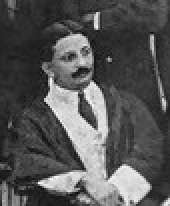K. T. Shah

Prof K.T. Shah is known for his active role in the Constituent Assembly (General, Bihar) responsible for framing of the Indian Constitution. An alumnus of the London School of Economics, he was a socialist leader.[1][2] He was the main rival candidate for the first presidential election of Independent India, though losing to Dr. Rajendra Prasad by securing 15.3% of votes.
Contribution in Constituent Assembly[3]
Prof K.T. Shah was a representative from Bihar and contributed immensely in the Constituent Assembly Debates. He was a member of Advisory Committee and Sub-Committee on Fundamental Rights.[4] He made important interventions in the Constituent Assembly.
Although several of his proposed amendments were rejected then, but some of them were later adopted by coming governments. 1. Professor KT Shah made two attempts to get the word "secular" included in the Constitution but failed on both the occasions. He had moved yet another amendment that India, being a secular state, should have nothing to do with any religion, creed and/or profession of faith and would be totally detached in all matters of religion.[5]
2. Professor KT Shah envisioned a greater role for Judiciary in providing social transformation. In a debate on November 19, 1948, he said that "[The judiciary] is the only authority that we are going to set up in the Constitution to give effect to whatever hopes and aspirations, ambitions and desires, we may have in making these laws and in laying down this Constitution." [6]
3. Prof KT Shah wanted to include Secular, Federal and Socialist in Article 1 and moved amendments twice for the same, Dr. Ambedkar rejected both the amendments at the meeting of the Drafting Committee.[7]
4. Prof KT Shah also stood for equality of states in the Union Of States, so following amendment was raised, India shall be Union of States which are equal inter se. This amendment wasn't passed but agreed upon that provinces and states shall be merged and given equal status but now was too soon for that to happen.[8]
5. Prof KT Shah had also suggested the formation of competent Boundary Commission, or any other body or authority to settle and decide boundary readjustments. He even suggested direct referendum to make required boundary changes.[8]
6. Prof KT Shah was in favor of the adoption of Presidential system of government.
Other Facts
References
- ↑ Niraja Gopal Jayal (15 February 2013). Citizenship and Its Discontents. Harvard University Press. pp. 271–. ISBN 978-0-674-07099-8.
- ↑ http://www.parliamentofindia.nic.in/ls/debates/facts.htm
- ↑ "CADIndia". cadindia.clpr.org.in. Retrieved 2018-01-16.
- ↑ "CADIndia". cadindia.clpr.org.in. Retrieved 2018-01-16.
- ↑ Sanjay Kaushik (1998). A. B. Vajpayee: An Eloquent Speaker and a Visionary Parliamentarian. APH Publishing. pp. 44–. ISBN 978-81-7024-976-4.
- ↑ http://www.frontline.in/static/html/fl3008/stories/20130503300801000.htm
- ↑ Shree Govind Mishra (2000). Democracy in India. Sanbun Publishers. pp. 187–. ISBN 978-3-473-47305-2.
- 1 2 Dr. Suman Sharma (1995). State Boundary Changes in India. Deep & Deep Publications. pp. 143–.
- ↑ http://www.epw.in/system/files/pdf/1953_5/11/prof_k_t_shah.pdf
- ↑ http://www.mainstreamweekly.net/article5159.html